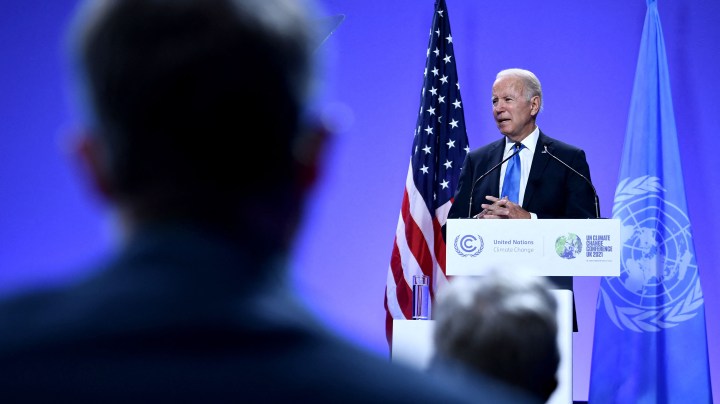
Biden, G-7, want to counter China’s financing for developing nations
Biden, G-7, want to counter China’s financing for developing nations

Addressing the COP26 meeting in Glasgow today, President Joe Biden said there was an urgent need for high-quality, climate-friendly infrastructure in developing countries, and that some of the world’s advanced economies would finance that infrastructure globally.
It’s part of the “Build Back Better World” initiative the White House and G-7 country leaders announced back in June, with a focus on climate, health, digital technology and gender equity and equality.
Biden said he wanted to offer developing countries a transparent alternative to “debt traps and corruption,” an oblique reference to China’s Belt and Road initiative.
“China has been going around the world, having a lot of cash on hand and willingness to spend it, going to countries and saying, ‘We will build you a railroad. We will build you a power plant. We will build you a transit network or an energy network,’” explained Adam Posen, president of the Peterson Institute for International Economics.
The lending to make those projects happen has been criticized for its lack of transparency and regard for social and environmental concerns, offered “often with conditions that are either political or foreign policy vis-à-vis Taiwan, or just simply that take advantage of the borrowing countries,” Posen said.
Posen said that the U.S. and other advanced economies weren’t strangers to political conditions on lending. “To be fair … it’s not as though the U.S. and the G-7 haven’t done that sort of thing with respect to Ukraine or Israel or, for that matter, Taiwan, in the past, in the other direction.”
But when it comes to protecting the interests of developing nations, the U.S. and G-7 are members of the Paris Club treatment, a group of creditor nations focused on finding workable solutions faced by debtor nations. China is not a member, and its Belt and Road lending agreements have prohibited borrower countries from seeking relief there.
“If you get in trouble, you cannot reach out to the international community to say, ‘Help, we want to refinance this loan,’” said Jennifer Hillman, a senior fellow at the Council on Foreign Relations.
A Council on Foreign Relations task force concluded earlier this year that Belt and Road lending was contributing to unsustainable debt in poor countries, allowing subsidized market opportunities for state-owned and non-market oriented Chinese companies and promoting coal power.
The report’s authors have warned that the Belt and Road initiative also “promotes exclusive reliance on Chinese technology and draws countries into tighter economic and political relationships with Beijing,” and argue the Build Back Better World initiative is not sufficient.
There is a geopolitical concern as well for the U.S., according to Zeno Leoni, a lecturer at King’s College in London. “The U.S. fears that China with all its investments through [Belt and Road] is kind of drawing to its economic sphere of influence countries which historically have been very close U.S. allies,” he said.
European allies have not been as hawkish on China as the U.S. has in recent years, Leoni said. The focus on shared values around climate change is one way to bridge that gap.
Concern over China aside, “the G-7 should be doing this anyway,” said the Peterson Institute’s Posen, “because due to the aging of our societies and the opportunities out there in the world, as well as the need shown by climate change and the pandemic for developing countries to be more stable and better looked after. It’s in our interest to fund and encourage private investment in these countries.”
If the U.S. and G-7 countries are to do so, and provide an alternative to China’s Belt and Road initiative, they’re going to have to convince their private sectors to go along — that’s where the financing would mostly come from, said Jonathan Hillman, a senior fellow at the Center for Strategic and International Studies.
“There’s a lot of money sitting on the sidelines. Something needs to be done, though, to make investing in some of these projects more attractive for investors,” Hillman said.
That’s where details are limited right now — what kinds of incentives might come together to connect the money in the U.S. and its advanced economy allies with the needs of the developing world.
There’s a lot happening in the world. Through it all, Marketplace is here for you.
You rely on Marketplace to break down the world’s events and tell you how it affects you in a fact-based, approachable way. We rely on your financial support to keep making that possible.
Your donation today powers the independent journalism that you rely on. For just $5/month, you can help sustain Marketplace so we can keep reporting on the things that matter to you.











